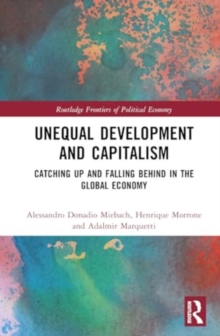
The Political Economy of State Intervention : Conserving Capital over the West’s Long Depression EPUB
by Gavin (University of East London, UK) Poynter
Part of the Routledge Frontiers of Political Economy series
EPUB
Description
Both the exponents and critics of neoliberalism assert the dominance of market forces in western nations.
The Political Economy of State Intervention calls this into question.
Through a re-examination of state intervention in the USA and Britain over the course of the "long depression" (1970-to date), this book argues that the state has performed an increasingly significant role in conserving capital, propping up an economic and social order that has lost its productive dynamism. The specific forms of capital’s dependency on the state may vary, however the underlying weaknesses of mature western economies have prompted new forms of state intervention narrowly aimed at conserving capital, especially in the wake of the financial crisis.
The chapters consider factors which are usually posited as explanations for the long depression such as oil price shocks, domestic conditions and technological innovation.
The work argues that the consensus view of neoliberalism has served to underplay the significance of the state’s role in failing to lift this long depression in several ways: it has lent a greater ideological coherence to the policies pursued by successive governments than they deserve; the state has been less subordinate to the market than is usually claimed and more often its maker; and there has been a significant growth in jobs located in the private sector that are funded by public money.
The cumulative effect of this is a narrowing of the state’s purpose to conserving capital, a role which has contributed to its loss of authority as an institution that claims to represent society as a whole.
It is theorised that this, in turn, has led to the insecurities of the existing political order and the rise of populism.
This book will be of great interest to students and scholars of political economy, public policy, political theory, economics and sociology.
Information
-
Download - Immediately Available
- Format:EPUB
- Pages:240 pages, 13 Tables, black and white; 26 Line drawings, black and white; 26 Illustrations, black an
- Publisher:Taylor & Francis Ltd
- Publication Date:25/11/2020
- Category:
- ISBN:9781000225860
Information
-
Download - Immediately Available
- Format:EPUB
- Pages:240 pages, 13 Tables, black and white; 26 Line drawings, black and white; 26 Illustrations, black an
- Publisher:Taylor & Francis Ltd
- Publication Date:25/11/2020
- Category:
- ISBN:9781000225860










